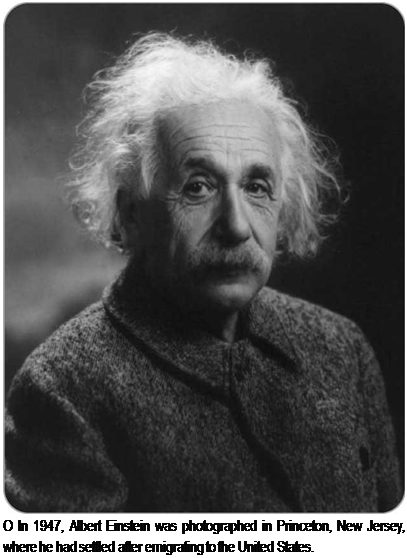Einstein, Albert
Date of birth: March 14, 1879.
Place of birth: Wurttemberg, Germany. Died: April 18, 1955.
Major contribution: Developed general and special theories of relativity, explaining the motion of bodies in space and time.
Awards: Nobel Prize in Physics; Copley Medal of the Royal Society of London, United Kingdom; Gold Medal of the Royal Astronomical Society, United Kingdom; Franklin Medal of the Franklin Institute, Philadelphia; Max-Planck Medal of the German Physical Society; honors from many universities and other institutions.
|
A |
lbert Einstein became interested in science and mathematics as a child. Although brilliant, Einstein was not a good student. He had little patience for learning by memorization, which was the common method of education at the time. At sixteen, he dropped out of school for a while. Later, at university in Switzerland, he angered his professors by skipping classes so he could focus on his own ideas.
Einstein earned a teacher’s diploma in 1901, but he could not find a teaching job. His situation continued to worsen for two years, until a family friend found Einstein employment in the patent office in Bern, Switzerland. The job gave Einstein an income. Because it was not demanding, it also gave him time to think about theoretical problems.
In 1905, Einstein published several scientific papers. One set forth his Special Theory of Relativity. Another offered his famous equation E=mc2 (that is, energy is equal to the mass of an object times the speed of light squared). Einstein said that an object cannot move as fast as the speed of light, although it can near that speed. The closer it gets to that speed, the slower time passes for that object from the perspective of someone who is standing still.
In 1915 Einstein published another paper explaining his General Theory of Relativity. In this, he stated that time joins the three dimensions of space (height, width, and depth) as a dimension of matter. Matter, Einstein said, exists in “space-time,” and gravitation is a bending of space-time that pulls objects toward each other. He proposed that the curvature of space-time would cause light to be bent around the Sun.
Einstein’s ideas were not widely accepted at first. In 1919, however, scientists found that the light from stars did bend around the Sun, as Einstein had suggested. Immediately, he was hailed as a genius.
Einstein became one of the most famous scientists of his age. He gave lectures and speeches around the world. By the early 1930s, however, Germany— where Einstein then lived—was no longer safe. Adolf Hitler and his Nazi Party were growing in power and began persecuting Jews. Einstein, who was a Jew, left Germany in 1932. He settled in Princeton, New Jersey.
 As the 1930s progressed,
As the 1930s progressed,
Hitler gained more power in Germany and began to rebuild the nation’s armed forces. Meanwhile, scientists there and in other countries began using the theories of Einstein and other physicists to develop a powerful new weapon: the atomic bomb. In 1939 Einstein wrote a letter to the U. S. president, Franklin D. Roosevelt, warning him that the Germans were making progress in this work. He urged Roosevelt to undertake a crash program to develop such a weapon.
As a result, the Manhattan Project was launched. The huge U. S. project produced the world’s first atomic weapons, which were used in 1945 on two Japanese cities in a devasting-and successful-attempt to persuade Japan to surrender. The bombings brought an end to World War II.
Einstein spent the rest of his years in pursuit of two causes. One was peace. Although he had supported the fight against Hitler during World War II, Einstein was generally a pacifist. The other was an attempt to develop a unified field theory in physics-that is, Einstein hoped to explain how the major theories in physics could all be united in one single idea. He was unable to
achieve this goal before his death. Even today, physicists still wrestle with the problem.
N
SEE ALSO:
• Energy • Force • Gravity
• Newton, Isaac • Relativity,
Theory of










